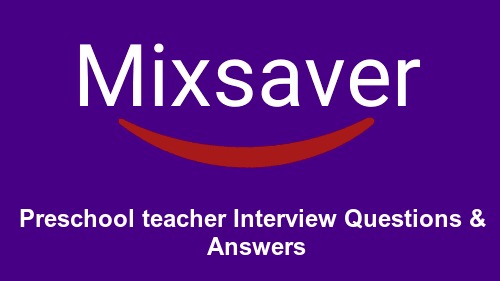1. Tell us about your preschool teacher education (i.e. educational qualifications)
Any job in this world requires either a skill set or an academic degree or both. Ensure that you answer this question in a factual and concise manner. The answers that you provide may be referenced and checked; present accordingly.
2. Why did you select a preschool teacher career?
Being a preschool teacher is not an easy job. And not everyone can be a preschool teacher. There has to be some aspects in yourself that made you desire such a position and that will make you the perfect candidate for a preschool teacher job position.
One of the most important aspects is that you should have a natural love for kids and enjoy helping them and being surrounded by them. There is no place for irritability, intolerance or impatience in the job and life of a preschool teacher. These are the concepts that you should bring out in the interview answers, with perhaps a brief, revealing anecdote or two.
3. How would you handle a particular situation in the kindergarten classroom?
This question is more or less aimed at finding out whether you can think on your feet and how child-appropriate your course of action or thought is. Describe how you handle children wanting the same toy. Or what you would do if one child ruin’s his classmate’s art project or kicks and hits.
Detail how each child is spoken to; how you focus your attention on the injured party.
4. What do you think is the most important aspect that a kindergarten works on, and what is the most important aspect that a preschool teacher imparts to the child?
Education is not just teaching the written word, but it is also molding an entire generation into forward thinking, practical individuals. Also, values are the most important aspects that one can give to the young generation.
Therefore, you should be careful and answer the question with an answer that would send across the point that you focus on the discipline and values that a preschool teacher can impart to children. This is the time to arouse in the children interest in learning and socializing appropriately, while introducing them to rules and regulations.
5. What do you think are your strengths and weaknesses? How would these have an influence on the pre-school?
No human being is without their strengths and weaknesses. In your response, begin and end with your strengths. Do not overly emphasize your weaknesses, and mentioning one or two should suffice. If it is something that would possibly interfere with your work, explain how you compensate. Focus on your positive attributes and how they help you perform well.
6. What is the meaning of a primary caregiver to a child?
this is a term used instead of ‘mother’ or ‘father’, as many children today are raised by one parent or another person entirely, be it relative or friend. This term avoids calling attention to each child’s state. If there are children in the class whose primary caregiver is not the mother, sensitivity and forethought will allow you to tell all kinds of stories without upsetting or embarrassing children.
7. "What would the daily schedule look like in your classroom?"
The interviewer is probably not looking for the play-by-play of how you would organize your preschooler's day, but rather a brief overview of the types of activities you would provide the students. For example, "I believe that the preschool day should have a balance of indoor and outdoor, quiet and noisy, and small group, individual and large group activities. I would like to open the day with a large group activity to discuss the plan for the day and then move on to small group centers. I would plan for at least two outdoor playtimes each day, weather permitting, and close with another quiet large group activity before dismissal. I think it's most important to be flexible about schedules as a preschool teacher, though. If the children are engaged in an activity, I would have no problem continuing it and reworking the daily schedule to allow for these things."
8. "How would you deal with a child who is biting or acting aggressively?"
As the interview goes on, the director or principal may begin to ask more "What would you do if..." questions. The best way to prepare for these types of questions is to know not only how you would handle this situation, but to be able to give a developmentally appropriate reason for doing so. For example, "Children who bite or act aggressively are often lacking the language to tell others what they are feeling. After observing the child for a short time, I would attempt to stop the biting by shadowing the child, documenting the behaviors and the events that led up to them and trying to find the root cause of the biting or aggression."
9. "What would you do to promote parental involvement?"
This is often a big question for preschool directors. They often have hundreds of parents to keep happy, and having teachers that are able to take the reins and plan parent luncheons, family days and other activities will help them tremendously. If you have any prior experience planning family days or parent activities, be sure to take this opportunity to toot your own horn! For example, "At my last job, I planned the school's annual Apple Fest. It was a Saturday afternoon affair for the whole family with games, prizes and food. It was a lot of work, but I enjoyed it because we were able to connect with a lot of the families in a way that isn't always possible during the school day."
10. "How would you deal with an irate parent?"
You may be surprised to hear this question in an interview, but it is something a director or principal will be concerned about. Often, the director is unable to be involved in the day to day happenings of every classroom in the school and may be unaware of an irate parent situation. Answer honestly, and take this opportunity to show off your professionalism. For example, "I would ask the parent to speak privately, either by leaving the room or asking them to call me at the end of the day, as I wouldn't want the children to see me having a heated discussion with a parent. I would do my best to answer the parent's questions and explain any situation they may have an issue with. As a last resort, I would speak to the director or assistant director if I were having trouble communicating with the parent."
11. What did you find to be the most difficult aspect of student (intern) teaching???
For me, the most difficult part of student teaching is the limited contact hours with students within one class period (or day). When I teach, I have so much information that I?would like to impart to my students that time flies by too fast. I always go to my classes full of energy and armed with lessons which I believe will stimulate curiosity and?spark understanding and new insights in my students. There is so much information that I need to present for them to have a comprehensive understanding of a concept. My?challenge is to make sure that I structure my lessons so effectively that learning takes place in one class period (or day). So I plan ahead to maximize every minute of my?class period (or day).
13. What ways do you assess and evaluate students?
In assessing students, I make use of different methods. I use formal and informal assessment procedures to promote social, academic, and physical development. The usual?assessment that I use is written quizzes (case studies, discussions) and examinations. Throughout the semester, I also grade and assess students on their class participation?such as recitations, reports, group activities, and seat work. I also assess and grade students based on their completion of assignments and timeliness in submission. I?also use authentic/alternative assessments, in which the student shows they can perform a task, such as making a speech or writing a story. I like to use written, oral, and day-to-day assessments.
14. What would your master teacher or cooperating teacher say about you?
My master teacher would say that I am incredibly energetic in teaching because I love what I do! She would say that I am the type of person who also goes the extra mile to help my students learn and comprehend their lessons regardless of their abilities. She would say that I also try to teach values that are important in life, including the value of ?discipline.
15. Do you enjoy teaching children? If so, how would I know if I observed your class? ??
What I most enjoy in teaching is hearing my students explain, in their own words, what they learned in a particular lesson and watching them enjoy participating in a lesson. When you observe my class, you will see that I get my students engaged in our discussions and activities. You will see that my students actively participate in each lesson. I make sure that all of them have a chance to speak, express their thoughts, and share them with the class. I enjoy how their faces brighten every time I recognize their efforts to learn by saying, “Very good,” “That’s a great idea,” “Good job,” and other encouraging phrases. At the end of the lesson, you will hear the students explain what they learned. Most of all, you’ll know that I enjoy teaching because the children in my class look happy.





